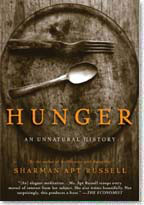 Russell’s survey of the effects of hunger, which moves inexorably toward a wider moral meditation on starvation, suggests, “Hunger is a country we enter every day, like a commuter across a friendly border.”
Russell’s survey of the effects of hunger, which moves inexorably toward a wider moral meditation on starvation, suggests, “Hunger is a country we enter every day, like a commuter across a friendly border.”
Observing that “not eating seems to be innately religious,” Russell (Anatomy of a Rose) explores the biochemical and cultural dimensions of hunger, from the stunts of “hunger artists” to the practices of fasting ascetics and so-called “miracle maids” (virginal women who appeared not to require food), touching on her own abortive experience of fasting.
Turning to the history of political protest, Russell describes the force-feeding of British suffragettes and the strategic fasts of Mahatma Gandhi. She captures the limits of human cruelty and frailty in detailing the medical studies of starvation conducted in the Warsaw Ghetto; famine and cannibalism in the Ukraine and China; and the findings of the “Minnesota Experiment,” which studied how semistarvation influences behavior.
Addressing the stark facts of current world hunger, Russell reports on the medical challenges of reintroducing food to the chronically malnourished, on the iconic image of the starving child and on the efforts of humanitarian agencies to end world hunger. With its expert blend of scientific reportage, world history and moral commentary, Russell’s work is informative and haunting.
Russell describes the physiological effects of hunger, starting with what occurs in the digestive system while the subject is watching a commercial for the Olive Garden restaurant and ending with the bodys processing of the last bit of pasta and anchovy. Her discussion of the biological aspects is concise, interesting, and free from scientific jargon.
After covering what happens when the body has food, Russell gives a sobering account of what occurs in the mind and body when food is withheld. Using fasting periods from 18 hours to 30 days, the author shows the extraordinary ways in which the deprived body tries to save itself. Her choices for the historical overview of hunger include hunger artists, religious and politically motivated fasting, therapeutic fasting, famines, experiments on starvation, anorexia, and efforts to combat world hunger.
Author: Sharman Apt Russell
Year of Release: 2006